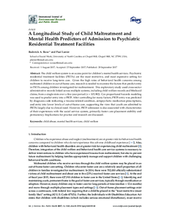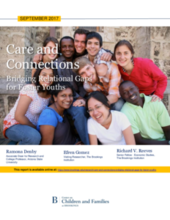This page contains documents and other resources related to children's care in the Americas. Browse resources by region, country, or category.
Displaying 1041 - 1050 of 1438
This study sought to expand the literature on the comorbidity of foster care and substance abuse and mental illness by undertaking a secondary analysis of a large national cohort in the US.
This article discusses knowledge on the traumas that this hidden, although expanding, group of youth experience, as well as the interventions, clinical services, and policies that can benefit these youth.
The objective of this presentation is to highlight, through the presentation of a clinical case example, how a community-based social services agency, such as Northern Virginia Family Service (NVFS), responds to the psychosocial needs of unaccompanied minors and their families and addresses and mediates barriers to successful family reunification.
This presentation will review the needs of traumatized children in foster care and appropriate clinical response, including diagnosis, treatment planning, and follow-up.
This talk will explore the adaptation of FOCUS, an evidence-based, skill-building preventive intervention, for foster families and foster youth in college and provide clinical adaptations.
The goal of this presentation is to describe a unique manualized Adoption-Specific Intervention (ADAPT) intervention, developed specifically for families adopting older foster care youth. Important lessons for mental health clinicians working with families of adopted youth will be discussed.
Anecdotal and limited objective studies have indicated that children and youth being raised in nonparental settings, such as those with custodial grandparents or in foster care, show a higher need for mental health services. They are often prescribed psychotropic medications at a higher rate. The authors set out to study the prevalence of this trend in a sample group of suburban community health center child and adolescent patients who are being served through an outpatient school-based program of Prince William County, Virginia in the US.
This document sheds some light on where funding discussions currently stand with regard to U.S. government programs for global children and youth issues.
This exploratory study used cross-sector administrative records linked across multiple systems, including child welfare records and Medicaid claims, from a single state in the U.S. over a five-year period, to investigate the factors that predict entry into psychiatric residential treatment facilities for children.
This report explores the challenges of implementing and evaluating relationship-based interventions for young people with experience in the U.S. foster care system and presents recommendations for both practitioners and researchers for successful implementation and evaluation in the future.




